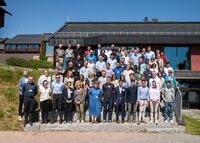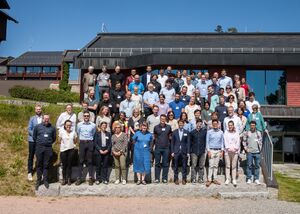Battery 2030+ / HYDRA Standards and Best Practices Workshop
Description
An in-person workshop in Oslo focusing on standards and best practices in battery research covering topics like data handling, testing workflows, model workflows, automation, and knowledge management.
| Item | |
|---|---|
| Type(s)/Category(s) | Event |
| Event | |
|---|---|
| Event series | |
| Start date | 2024-06-26 |
| End date | 2024-06-26 |
| Duration | |
| Location | Scandic Holmenkollen Park Hotel |
| URL | |
| Organizer | SINTEF, Simon Clark, Uppsala University |
| Minutes taker | |
| Project(s) | Battery 2030+, HYDRA |
| Associated OU(s) | |
Workshop Content
Overview
The joint Workshop on Standards and Best Practices in battery research was a collaborative event between the EU research projects Battery 2030+ and HYDRA. As a CSA for battery research activities in Europe, Battery 2030+ has played a leading role in defining and promoting the use of standards and best practices in battery research and innovation. The RIA HYDRA has been one of the first projects from outside the Battery 2030+ family to implement and provide feedback to the work on standards and best practices. This workshop brought together researchers from both projects and the wider community to showcase examples of how these recommendations are being implemented today, as well as to discuss where bottlenecks exist and what topics future development should focus on.
Throughout the day, the audience was polled with some survey questions. The results are summarized in this document.
Data Handling
Eibar Flores from SINTEF presented a Linked Data Primer that introduced the challenges associated with trying to harmonize data coming from different sources and different domains within the battery field. He highlighted communication breakdowns that exist in current data workflows and proposed that some concepts from Linked Data can help to address them. His presentation focused first on establishing the foundational concepts in Linked Data as an introduction for non-experts. He then extended this to examples in the battery space to set the stage for the following presentations.
Unifying Test Data
Brady Planden from Oxford University gave a presentation on the challenges of unifying battery test data that comes from different labs, sources, or cyclers. He gave a demonstration of the open-source framework Galv, which is being led by software developers at Oxford. The framework consists of harvesters that check for battery data in a defined place (e.g. a given directory on a local or remote machine). If new data is found it is pushed into a SQL database together with metadata that is available. The user interacts with the system through a web-based frontend that allows users to search for datasets, dashboard the data, and assing/edit the metadata. It is in ongoing development and would welcome beta testers and contributors from the community.
Battery Model Parameterization
Elixabete Ayerbe from Cidetec gave a talk on the importance of standardizing methods to parameterize physics-based battery models. Establishing SOPs for these measurements helpful - both for ensuring the correct interpretation and use of parameters obtained from measurements and for reporting them in a consistent way. Her presentation highlighted P2D model results that were created in the open-source modelling framework cideMod.
Laboratory Automation
Nukorn Plainpan from EMPA presented recent advancements their lab has made in the automation of battery coin cell preparation and testing. They have created a coin cell assembly robot called AURORA that can build batches of 32 coin cells at a time. The workflows are managed through Aiida, which can be configured to send testing instructions to BaSyTec hardware. Finally, they are working to annotate their data with the Battery Interface Ontology and have created a user-friendly template to convert metadata in an excel table into JSON-LD.
Knowledge Management
Philipp Veit from KIT and Lukas Gold from Fraunhofer ISC made a joint presentation about the development of a Battery Knowledge Base - the very platform you are reading right now! Philipp discussed how KIT performed the extensive task of mapping the battery cell manufacturing process by outlining the major process, control parameters, key performance indicators, material flows, and interdependencies in a first version. Lukas then showed how that information could be parsed, semantically annotated, and integrated into a knowledge base using the Open Semantic Lab platform. Participants were invited to follow along and create their own user page during the presentation. One main goal of the Knowledge Base is to collect and formalize standard protocols for theory and experiment in the battery space. Please feel free to add your expertise and the expertise of your groups and consortiums there and spread the word about this new platform.
Venue
The workshop was held at the Scandic Holmenkollen Park Hotel in Oslo, Norway on June 26th, 2024.
Agenda
You can click on the (blue and underlined) sections to open the slides of the presentation.
jsondata
| type |
| ||||||||||||||||||||||||
|---|---|---|---|---|---|---|---|---|---|---|---|---|---|---|---|---|---|---|---|---|---|---|---|---|---|
| uuid | "3b405820-1606-4d89-8bfc-762240674edc" | ||||||||||||||||||||||||
| label |
| ||||||||||||||||||||||||
| description |
| ||||||||||||||||||||||||
| project |
| ||||||||||||||||||||||||
| name | "Battery2030HydraStandardsAndBestPracticesWorkshop" | ||||||||||||||||||||||||
| participants |
| ||||||||||||||||||||||||
| location_name | "Item:OSWc64e09bf51164188bd02dc328726974a" | ||||||||||||||||||||||||
| event_classifier | "external" | ||||||||||||||||||||||||
| image | "File:OSW898a6002dbcd484ba59b7d85062d4788.jpg" | ||||||||||||||||||||||||
| attachments |
| ||||||||||||||||||||||||
| start_date | "2024-06-26" | ||||||||||||||||||||||||
| end_date | "2024-06-26" | ||||||||||||||||||||||||
| organizer |
|

























